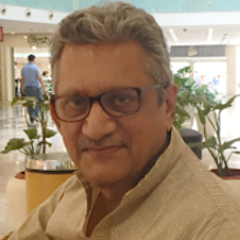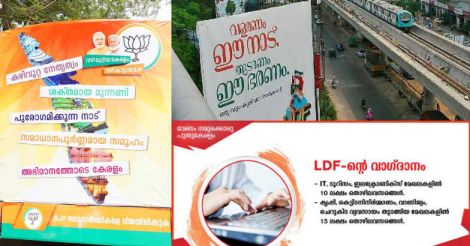The forthcoming election does not offer the people of Kerala any real choice in terms of a roadmap for the future because the core programme contents of both UDF and LDF are more or less the same. Add a bit of unstated minority bashing, especially Muslim bashing, and you have the NDA in Kerala.
Not that there are no subtle differences in the programme details or behavioural patterns but there is an underlying acceptance of a presumed Kerala consensus on values and priorities. The earlier differences on the question of atheism and godliness have completely disappeared. Political leaders do not hesitate to woo religious leaders openly and religious leaders make it quite clear that they are open to do business with any political party.
Except for the hostility between Muslim League, Congress and the two Communist parties on the one hand and BJP on the other, there is no untouchability among political parties.
Read more by the author: Kerala model's gains impressive but what about the rot inside?
Chandy showed spunk in standoff with high command; your turn now, Pinarayi
For Kerala, an opportunity to retire footloose politicos and parties
Needed, a consensus on tackling graft
Parties such as Kerala Congress, RSP and various factions of the Janatha Dal family are footloose and can switch anytime to any Front that is perceived to have a winning chance in the elections. Politics in Kerala has practically become ideology agnostic.
When I came to Kerala some years ago to settle down here after spending most of my adult life outside the state, I felt that there is some disconnect between the state’s political leaders and the man on the street. My view is, however, contested by the politically active people. I feel that they are actually suffering from their version of what the management science calls “marketing myopia”. People in business who suffer from this are so enthralled by the success of their particular line of business that they fail to notice the technology changes happening behind them that would make their business irrelevant. The political activists and their cohorts among the intelligentsia have grown up in a certain political ambience since the formation of the state that blinds them to the reality that the largescale overseas migration of Keralites has radically altered their global perspectives and aspirations.
Not only have large numbers of the younger generation migrated to the western countries but their parents and close relatives have been travelling abroad on a scale unimaginable in the olden days. No doubt the impact of the exposure to West Asia and the West differs significantly but common to life in the two highly divergent societal milieus are a standard of living and quality of infrastructure which are vastly different from anything that we have in Kerala. The social life indicators in Kerala are much superior to those of West Asia but we have come to take these for granted and worry about the poor quality of infrastructure here. The ubiquitous presence of television with its multiple international channels and programmes has increased this sense of deprivation and inferiority.
Political leaders and self-styled intellectuals may say that life here is much better but the common man is far from convinced. Add to this the abysmal quality of education and the rampant corruption in everyday matters and we have enough reasons to dream of a different Kerala and a different way of life. The populist measures of homeopathically incremental developmental activities agreed to by a consensus among the highly vocal minority representing vested interests leave the common man cynical and pessimistic.
My first experience of public cynicism was at a public meeting to elicit public views on a proposed master plan for my new hometown, Kottayam. I was invited to chair the meeting because of my earlier effort to introduce the concept of ecocity. As the animated discussions proceeded inconclusively, one gentleman stood up and said, “Nothing will change here. This is Kerala. The more we change things, the more they remain the same. Why do we waste our time?” What he said shows the frustration of the common man with Kerala’s unchanging scenario with a nonagenarian leader still hoping to become the Chief Minister. Which country in the world other than Zimbabwe has such an old man as the head of government? Even Fidel Castro felt that it was time to call it a day. When I see the way Achuthanandan goes around abusing everybody and criticising everything on earth, I feel like an adolescent of just 72! While I salute him for making me feel very young, I can’t help wondering when Kerala is going to change. Imagine a man born nearly a century ago guiding Kerala towards the end of the first quarter of the 21st century!
Forget the intellectuals' disdain for the Emergency of the seventies, Kerala needs a strong government. Forget the libertarian protestations or the anarchist views of the ultra progressive social activists, we need a strong government that can put down indiscipline with an iron hand. We need a government that will tell the shouting brigade of landowners that no infrastructure development is possible without somebody or other losing land and/or building. We need wide roads, expressways and stable power supply.
If Kerala is to develop, we need private entrepreneurship and private initiative to prosper even in the education sector. This does not mean that private entrepreneurs should be allowed to run amok. Let there be a very strict regulatory mechanism to ensure quality and transparency.
Corruption, be it in the education sector or any other, should be put down with a heavy hand even if it is practiced by religious institutions and there should be zero tolerance for corruption among government employees and zero tolerance for criminality in the ranks of the police. If criminal misconduct or corruption is established against a civilian government employee or a police officer, that person should be dismissed from service forthwith rather than be allowed to get away with lesser penalties.
We need to emulate modern China, not Stalinist Russia. We need a dynamic government that can move fast, not one that is lost in some ideological arid land or running to remain standstill as in Alice’s wonderland. We need a ‘no nonsense’ government that will be willing to take the political risk of annoying some people. We need a government that will create world class transport infrastructure, fix the education system and ensure speedy justice to all without fear or favour. The colour of the government does not matter.
(The author is a former civil aviation secretary and former member, Union Public Service Commission. The views expressed are personal.)

























 The forthcoming election does not offer the people of Kerala any real choice in terms of a roadmap for the future because the core programme contents of the major fronts lare more or less the same.
The forthcoming election does not offer the people of Kerala any real choice in terms of a roadmap for the future because the core programme contents of the major fronts lare more or less the same.